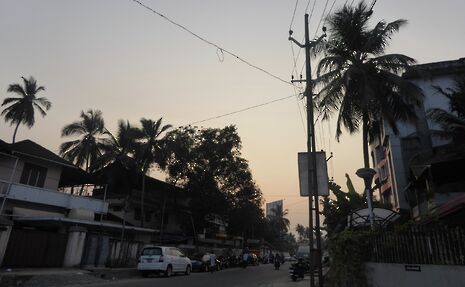Lessons learnt from non-profit internships
Flexibility, an open-mind and being proactive are all needed to make the most of an internship in low income foreign countries

The long summer vacation provides the perfect opportunity to devote a substantial amount of time to a non-profit organisation, but how you go about selecting an organisation is just as important as what you do once you get there. If you’d like to work overseas, it’s important to consider the impact of ‘voluntourism’ – the label applied to overseas placements which might do more harm than good.
I’ve worked with a school for low-income students, a foundation for unemployed youths and a trust for girls’ education. All my internships have been in India since I grew up there and I am keen to work in international development. My three summers working in for not-for-profit organisations were challenging and rewarding in equal measure; I treasure the memories and the lessons they have taught me about life in this field.
What privilege and attitudes do you bring to the job?
It helps to reflect on the complexities of working in low-income countries, such as the impact of privilege and positionality upon one’s attitudes, the danger of re-inscribing damaging cultural stereotypes about the ‘third world’ and practical difficulties such as language barriers.
For example, I’ve realised I need to become much more fluent in local languages before I can effectively communicate with the farmers targeted by non-profits in my hometown.
It’s also good to be critical about your own skills and reflect on which organisation and setting you could serve the best. The Effective Altruism Movement, for example, is a great resource for figuring out how to ‘make a difference’.
Be flexible
You could be doing anything from going out into the streets with a collection bucket to googling the UN’s latest data on female literacy rates. This range of work offers you a unique opportunity to grow your knowledge and experience .
Unlike interns in other sectors, I was never given a specific job title. As the organisations needed interns to be versatile, my position was always ambiguous.
Last summer, researching rural India pushed me to learn about new issues
Nonprofit organisations typically perform a range of functions: fundraising, administration, advocacy, research and marketin to name a few. This means that once you’ve begun work, it is important to be flexible.
Last summer, researching rural India pushed me to learn about new issues: the dilemmas of poor women who sell fish but can’t afford to icebox them, the advantages of rearing goats over cows, the potential of constructing elastic pipes for vegetable cultivators.
The dynamic placement helped me to understand the perspectives of people with wholly different priorities and problems to my own.
What assumptions have I made?
Nonprofit work has also transformed my perspective on problems which I thought I had understood. For example, while working with a trust for girls’ education, my assumptions about ‘empowerment’ were upended. In the case of girls whose parents did not allow them to go to school, I unconsciously assumed that the girls would want to get an education if given the chance.
However, listening to their stories made me realise that some had internalised the prevailing mindsets around them and genuinely considered school unnecessary, refusing to apply for the nonprofit’s scholarships because they thought that they lacked the intellectual ability. This gave me a more nuanced understanding of the situation and a renewed appreciation of the complexity of social change.
Non-profit work pushes you to transcend your psychological comfort zone, as you may see harrowing images or hear heartbreaking stories
It’s good to take some initiative and be proactive about your learning. In one internship, I asked if I could focus on research. Getting to prepare reports, commentaries and impact evaluations lent an entirely new dimension to my internship experience. I learned about pioneering efforts to eradicate global poverty and loved hearing the voices of the children at the heart of the nonprofit’s mission. It’s vital to stress, though, everyone involved is willing to help in whatever capacity would be best: flexibility is key in helping nonprofits achieve their day-to-day goals.
Non-profit work does push you to transcend your psychological comfort zone, as you may see harrowing images or hear heartbreaking stories. I once listened to the story of a woman in rural India who said she was overjoyed at having a toilet constructed for her by an NGO. The lack of sanitation in her house had prevented her from asking friends and family to visit. Consequently, she had been estranged from them for decades. Now, she felt as though she had regained her dignity and pride. One seemingly simple tweak in her lifestyle had brought an astonishing amount of change: heightened self-esteem, better health, reconciliation with loved ones.
The mixture of sadness, joy and hope I felt upon hearing such stories gave me an opportunity to reflect on the wider systemic structures producing inequality. Learning about contemporary crises and innovations to solve them can widen your horizons. I was lucky enough to be working in India while the very first development impact bond began in the country which made for an atmosphere of excitement and curiosity.
I’m excited to learn more about the non-profit sector as I now prepare to graduate and look for a full-time job. Ultimately, despite (or maybe even because of) the challenges, the field seems fascinating, transformative and incredibly rewarding.
 News / Uni Scout and Guide Club affirms trans inclusion 12 December 2025
News / Uni Scout and Guide Club affirms trans inclusion 12 December 2025 News / Pembroke to convert listed office building into accom9 December 2025
News / Pembroke to convert listed office building into accom9 December 2025 Features / Searching for community in queer Cambridge10 December 2025
Features / Searching for community in queer Cambridge10 December 2025 News / Uni redundancy consultation ‘falls short of legal duties’, unions say6 December 2025
News / Uni redundancy consultation ‘falls short of legal duties’, unions say6 December 2025 News / Gov declares £31m bus investment for Cambridge8 December 2025
News / Gov declares £31m bus investment for Cambridge8 December 2025









